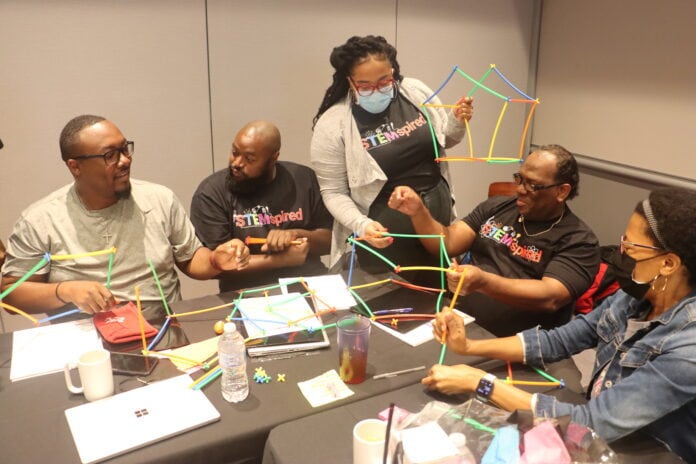CHISD Received Approximately $2 Million STEM Grant from Educate Texas
(CEDAR HILL, TEXAS) The Cedar Hill Independent School District received a transformative nearly $2 million Science, Technology, Engineering, Math (STEM) Grant from Educate Texas, an initiative of Communities Foundations of Texas and Texas Instruments last spring.
The district opens the Dr. Peggy M. Wilson STEM Center on Thursday, August 12 at 1515 West Belt Line Road. The Center is named in honor of a 94-year longtime Cedar Hill resident who achieved many firsts as a female scientist.
In order to boost the district’s #STEMSpired initiative with scholars and families, CHISD Executive Director of Innovation Tyesha Smith-Lowe, who led the effort to secure the grant, created a #STEMSpired Training for CHISD Campus Principals on June 22 at Main Event in Grand Prairie.
The purpose was to provide the principals with understanding and knowledge of the #STEMSpired Initiative and how they can integrate it on their respective campuses.
Concepts emphasized:
- Redesigning Learning – Engage scholars in learning experiences that build the skills necessary to thrive in a rapidly changing, technologically rich and global economy.
- Build partnerships – Increase equity and access to high-quality STEM education both inside and outside the classroom environment.
- Develop talent – Ensure that teachers and leaders are equipped to provide evidence-based, engaging instructional strategies that increase STEM literacy.
- Learn and Adapt – Monitor and evaluate CHISD district-wide STEM education and adjust when necessary by following our approved continuous improvement model.
A Model STEM District
“We want to become a model STEM District,” Smith-Lowe said. “There are 1.9 Million STEM job openings. What will we do to prepare our Pre-K Scholars for 1.9 Million STEM jobs?”
Smith-Lowe said there are currently “pockets of STEM” throughout the district, especially among Career and Technical Education (CTE) scholars.
“We have to provide the foundations for scholars to walk into STEM endorsements,” Smith-Lowe said. “If we teach them, they’ll rise to the occasion, and we can’t wait until high school.”
That is why the #STEMSpired initiative will impact CHISD scholars from Pre-K through graduation. She said the Texas Education Agency (TEA) is currently in the process of integrating STEM into the state-wide curriculum.
Smith-Lowe emphasized STEM and project-based learning as “a key driver of opportunity.”
She introduced Dr. Cindy Moss, a renowned STEM Education expert from “Defined Learning” in North Carolina.
“We have to share expectations with every teacher and make every scholar a problem solver,” Moss said. “STEM is about a culture, not a course or courses.”
“Students and Teachers Energizing Minds”
Moss encouraged the principals to think about STEM, not only as the fields of study it includes but also as “Students and Teachers Energizing Minds.”
She noted that many high-paying jobs go unfilled and scholarships go unawarded, due to a shortage of STEM-educated scholars in the United States.
“Algebra I is the best predictor of a STEM Career,” Moss said. “We have to teach our scholars how to collaborate effectively. Most of the time you won’t get it right the first time. You have to teach the scholars the importance of critical thinking.”
After Dr. Moss’ presentation, the principals enjoyed a lunch break, followed by presentations from Destination Imagination, a competitive extracurricular activity that has been popular in Texas for the past two decades. It currently involves 150,000 scholars in 30 different countries.
Destination Imagination Comes To CHISD
Renee Rainville presented information about Destination Imagination, via video conference, from her home in Great Britain.
Debra Jones, a Dallas-based educator, joined the principals in person to speak about her experiences with Destination Imagination, which will become available to CHISD scholars in 2021-2022.
It involves communication, creativity, critical thinking, resilience, collaboration, promptness, adaptability and time management. There are “Challenges” for Science, Engineering and Service Learning.
“Each challenge encourages scholars to challenge their passion, discover talent and abilities and learn new skills,” Jones said.
Scholars who are in the competitive division must practice an hour to 90 minutes per week. Scholars in the non-competitive division must practice for 45 minutes per month.
The Destination Imagination Regional and State Tournaments are held at the University of Texas at Arlington and the Global Championships are held in Kansas City.
After the Destination Imagination presentation, the principals did a Gravity Ropes Course – similar to zip-lining, and played laser tag. Both activities were part of their “team building” activities.














